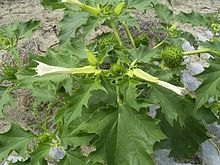| Revision as of 12:50, 24 July 2005 editEliasAlucard (talk | contribs)13,227 editsmNo edit summary← Previous edit | Revision as of 14:49, 24 July 2005 edit undoBrighterorange (talk | contribs)Administrators13,261 editsm Cleanup long sentences; remove link to personal page with link to missing articleNext edit → | ||
| Line 11: | Line 11: | ||
| The other plant known as Angel's Trumpet is closely related to Brugmansias, but looks quite different. ''] metel'' is shorter, and more of a shrub than a tree, with leaves that are not hairy and often have a purple tint to them. The young stems are typically shiny, dark purple. It has similar trumpet-shaped flowers, white, purple and white, or pale yellow, and more commonly is double-flowered; however, unlike Brugmansias, Daturas' flowers are somewhat less fragrant and point upwards, causing them to sometimes be called, in contrast, Devil's Trumpets. | The other plant known as Angel's Trumpet is closely related to Brugmansias, but looks quite different. ''] metel'' is shorter, and more of a shrub than a tree, with leaves that are not hairy and often have a purple tint to them. The young stems are typically shiny, dark purple. It has similar trumpet-shaped flowers, white, purple and white, or pale yellow, and more commonly is double-flowered; however, unlike Brugmansias, Daturas' flowers are somewhat less fragrant and point upwards, causing them to sometimes be called, in contrast, Devil's Trumpets. | ||
| As with many members of the Nightshade family, all parts of ''Brugmansia'' and ''Datura'' plants are ]. The plants are sometimes ingested for recreational or ]istic ] |
As with many members of the Nightshade family, all parts of ''Brugmansia'' and ''Datura'' plants are ]. The plants are sometimes ingested for recreational or ]istic ], however, because the potency of the toxic compounds in the plant is variable, the degree of intoxication is unpredictable, and can be fatal. In ], a teenager in ], took Angel's Trumpet in a mixture with ] and because of the severe ]s, cut off his own ] and ] with a pair of garden ]. Doctors have said that he will need years of ] ]. | ||
| ==External links== | ==External links== | ||
Revision as of 14:49, 24 July 2005
There are two related plants known as Angel's Trumpet, both members of the Solanaceae (Nightshade) family, along with tobacco, tomatoes and petunias.

The Brugmansias are large, tree-like plants, reaching heights of 10 feet or more, with tan, slightly rough bark. The leaves are generally large, 8 to 12 inches long, and are covered with fine hairs. Brugmansias are tropical plants, native to northwestern South America.
The plant gets its name from its large, very dramatic trumpet-shaped flowers, about 9 inches long and 6 inches across at the wide end. These flowers hang down from the branches reminiscent of heavenly trumpets directed towards the Earth. The flowers have a delicate, attractive scent with light lemony overtones, most noticeable in the calm of early evening.

The other plant known as Angel's Trumpet is closely related to Brugmansias, but looks quite different. Datura metel is shorter, and more of a shrub than a tree, with leaves that are not hairy and often have a purple tint to them. The young stems are typically shiny, dark purple. It has similar trumpet-shaped flowers, white, purple and white, or pale yellow, and more commonly is double-flowered; however, unlike Brugmansias, Daturas' flowers are somewhat less fragrant and point upwards, causing them to sometimes be called, in contrast, Devil's Trumpets.
As with many members of the Nightshade family, all parts of Brugmansia and Datura plants are toxic. The plants are sometimes ingested for recreational or shamanistic intoxication, however, because the potency of the toxic compounds in the plant is variable, the degree of intoxication is unpredictable, and can be fatal. In 2004, a teenager in Halle, Germany, took Angel's Trumpet in a mixture with tea and because of the severe hallucinations, cut off his own penis and tongue with a pair of garden shears. Doctors have said that he will need years of psychological aid.